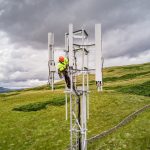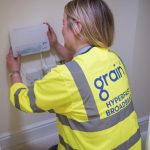Broadband Segregation Risk as ISPs Shun Slower Speed ADSL Lines

A few years ago Sky Broadband became the first ISP to stop accepting orders from UK customers on lines – often rural ones – where speeds were stuck below 2Mbps (here). Sadly more providers appear to have joined this club of shunning those on slower lines, which for some may exasperate the feeling of digital exclusion.
At present well below 1% of premises across the United Kingdom are estimated to fall into the sub-2Mbps capability bracket and most of those are in remote rural areas, although there are a few that remain strangled by longer copper Exchange Only Lines (EOL) in dense urban areas too. In the majority of these cases people will find that the only fixed line service available to them is a slow copper ADSL service.
Suffice to say that life, in the digital connectivity sense, is already hard enough for this shrinking group of consumers and that’s before they find out that quite a few of the biggest broadband ISPs won’t serve them. In a few cases there is no real technical reason for this (i.e. the broadband would still work, albeit slowly and probably less reliably too as the signals degrade a lot over longer copper lines).
Advertisement
Over the past few weeks ISPreview.co.uk has received several reports from consumers who complain they live in sub-2Mbps or similar slow speed areas and have had order requests refused by several of the biggest broadband ISPs (seems to occur more with orders placed over the phone). As a result we thought it might be handy to give an overview of where the main providers all stand. The gripes tend to go a bit like this one..
Example Complaint from Rural Essex:
“My house contains a tenanted apartment, and my new tenant moved in at the beginning of June 2019. When she tried to arrange a new internet service provider she was told by every single one that, due to the low download speed in our area (under 1.5Mbps), they would not be able to provide an ISP service.
This is all due to Ofcom’s new code of practice which came into effect on March 1st 2019, and states that ISP’s must guarantee the minimum speeds that they advertise. As this is impossible for them to guarantee in our area, the ISP’s won’t offer any service at all.”
In fairness there are some known caveats to the “every single one” claim above. For example, Virgin Media’s separate cable network predominantly serves urban areas and where they do exist they normally deliver on their advertised speeds. In that sense Virgin is already out of the running as an option for the vast majority of sub-2Mbps or similar areas.
Meanwhile we already know Sky’s policy (see top) and elsewhere Vodafone scrapped their ADSL services a little while back. Today Vodafone only sells FTTC on Openreach’s network and they do so alongside a guaranteed minimum speed that starts from 25Mbps, while their FTTH network is tiny and limited to Cityfibre’s urban coverage.
Out of the big ISPs that remain, the Post Office didn’t respond, while Plusnet denied that they shunned slower lines. A spokesperson told ISPreview.co.uk, “At Plusnet we believe in making things as fair and simple as possible, so customers are able to find out the speed they can expect when they sign-up. Being open at the point of sale gives our customers the choice on what they consider to be a minimum speed.”
Advertisement
The parent operator for Plusnet, BT, echoed their sibling: “We aim to make service as personal as possible. This includes making it clear to customers what speeds they can expect from BT at their address during the sign up process. This approach means that we do not reject broadband orders, as customers are well informed,” said a spokesperson. We assume EE follows this approach as they’re also part of BT.
By comparison TalkTalk said they aimed to provide all their customers with the “best possible experience … if a broadband line (ADSL) can only provide speeds of up to 6Mbps, we will only offer the customer a fibre service (where available) which will provide them with a faster, more reliable connection.” Put another way, hard luck if you live in an ADSL-only area and get sub-6Mbps.
TalkTalk’s position is particularly galling for those in this group because they have the largest fully unbundled (LLU) network by UK coverage after Sky and Vodafone, which makes them one of the cheapest alternative ADSL platforms to BT Wholesale based ISPs. All of this effectively makes it harder for those in such disadvantaged communities to get a cheaper service.
Why is this happening?
As above some of this change has to do with technological progress and a desire to move away from legacy networks. On the flip side Sky Broadband and TalkTalk have both claimed that it’s about ensuring a good experience for customers, although that’s questionable when the outcome is not to provide any service at all for fear that related users may be unhappy with it (problems streaming video, complaints etc.).
Advertisement
Another possibility is the impact of last year’s change by the Advertising Standards Authority (ASA), which told broadband ISPs to only advertise “average” speeds on their packages (i.e. the median download speed available to at least 50% of customers at peak-time). Some feared that this might encourage providers to reject slower lines so as to make their advertised rates look more appealing.
Ofcom’s recently revised Broadband Speed Code of Practice has also come in for similar criticism. The code effectively made it easier to exit a contract penalty free, such as when your speed falls below the Minimum Guaranteed Access Line Speed (MGALS) for the line (this figure reflects the slowest 10% of similar lines and could potentially create issues for ISPs that serve those on super slow and unstable ADSL lines).
Extract from Ofcom’s Speed CoP on MGALs Performance
Some respondents, including Andrews and Arnold, Openreach, and a member of the public, were concerned that defining the minimum speed (to which the right to exit is attached) as the 10th percentile of similar xDSL lines could imply that such lines are faulty rather than just at the lower end of the statistical distribution.
This definition does not categorise the bottom 10% of lines as faulty. For some customers, a fault may put them below this speed threshold, but for others the normal performance of their line will naturally fall below this threshold and no improvements are possible.
We consider this measure to be a reasonable minimum speed that will trigger the right to exit for consumers who are experiencing low speeds in comparison to their normally available estimate.
On top of all that a little bit of feedback has suggested that a few ISPs allegedly told customers that the reason for rejecting their orders was due to the regulator’s new Automatic Compensation scheme, although we haven’t seen enough evidence to confirm this. The ACS system only applies to missed appointments, delays to new service provision and downtime that lasts longer than 2 working days.
Continued on Page 2..
Mark is a professional technology writer, IT consultant and computer engineer from Dorset (England), he also founded ISPreview in 1999 and enjoys analysing the latest telecoms and broadband developments. Find me on X (Twitter), Mastodon, Facebook, BlueSky, Threads.net and Linkedin.
« UK ISP BT to Upgrade Internet Peering Network with Cisco 5500 Kit






















































Comments are closed